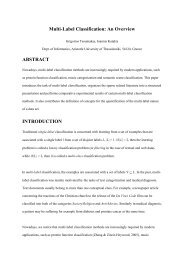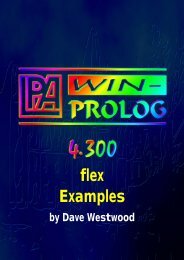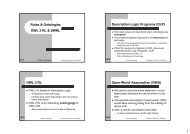Create successful ePaper yourself
Turn your PDF publications into a flip-book with our unique Google optimized e-Paper software.
3. Forward Chaining 36<br />
The basic cycle of chosing a rule and then firing that rule remains, but with<br />
some elaborations.<br />
1. In the simple model, the engine fires the first rule whose if part is satisfiable. A<br />
more sophisticated approach is to go through all the currently available rules,<br />
and check which ones are satisfiable. This forms a conflict set. Some algorithm<br />
is then used to select a rule to fire from this conflict set (this is called conflict<br />
resolution).<br />
2. In the simple model, the engine terminates only when no more rules can be<br />
selected. In the extended model the user can specify an alternative criterion (a<br />
Prolog call) for early termination. The engine will terminate as soon as the call<br />
succeeds, regardless of whether there are more rules which could be fired.<br />
3. The extended model also allows for the handling of the misfiring of rules. A rule<br />
is said to misfire if its conditions are satisfied but its actions fail for some reason.<br />
A recovery corresponds to the specified misfire program succeeding, in which<br />
case the cycle completes and the engine carries on. Otherwise an error<br />
condition is raised.<br />
4. The final extension to the simple model concerns the rule agenda, from which<br />
rule selections are made during each and every cycle of the engine. This agenda<br />
can be updated at the end of each cycle according to which rule was fired<br />
during that cycle. For example, removing that rule from the agenda means that<br />
rules can only be fired at most once during that particular forward chaining<br />
session. Other possibilities include re-ordering the list of rules thus making it<br />
more likely that certain rules will be fired next time.<br />
Ruleset<br />
Rules are grouped together into rulesets, and forward chaining is started<br />
using the KSL keywords invoke ruleset. This provides a construct for<br />
forming rules into stratified rule-bases and governing the forward-chaining<br />
engine in terms of rule selection method and agenda updating.<br />
For example, to move a piece in a game we might have a ruleset called<br />
make_move containing rules for possible moves.<br />
ruleset make_move<br />
contains corner_move, edge_move, centre_move .<br />
action move ;<br />
invoke ruleset make_move .<br />
<strong>flex</strong> toolkit








